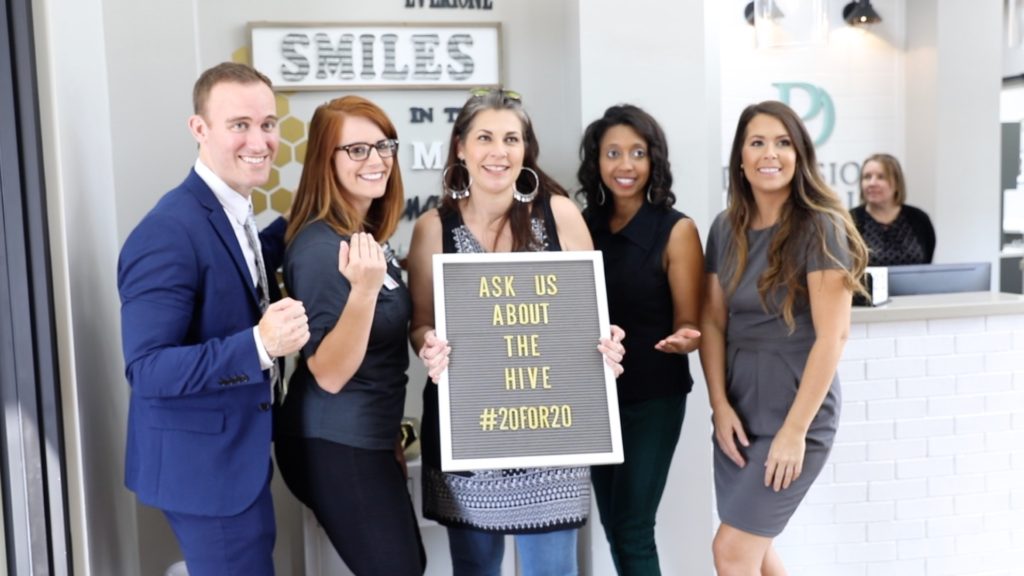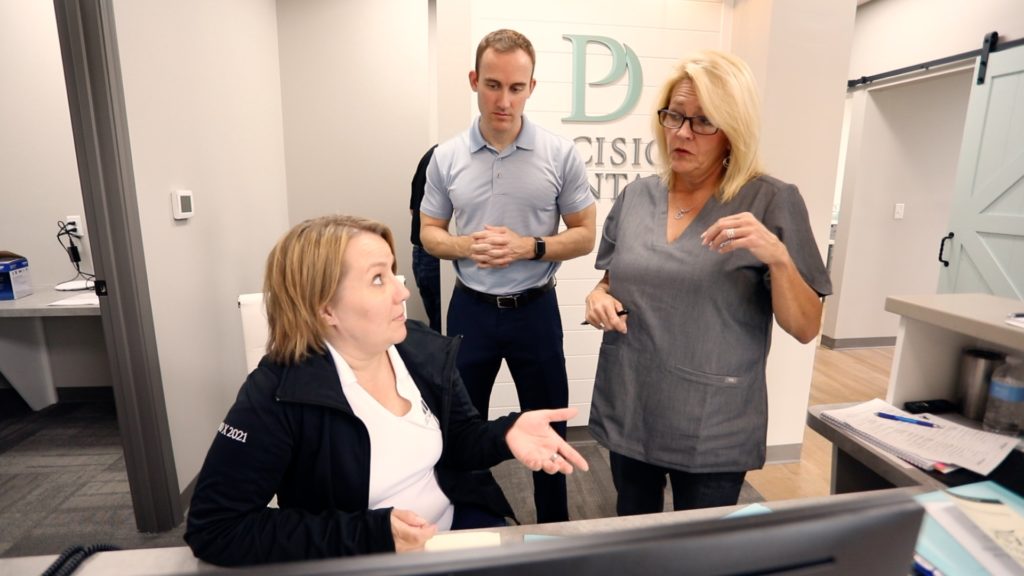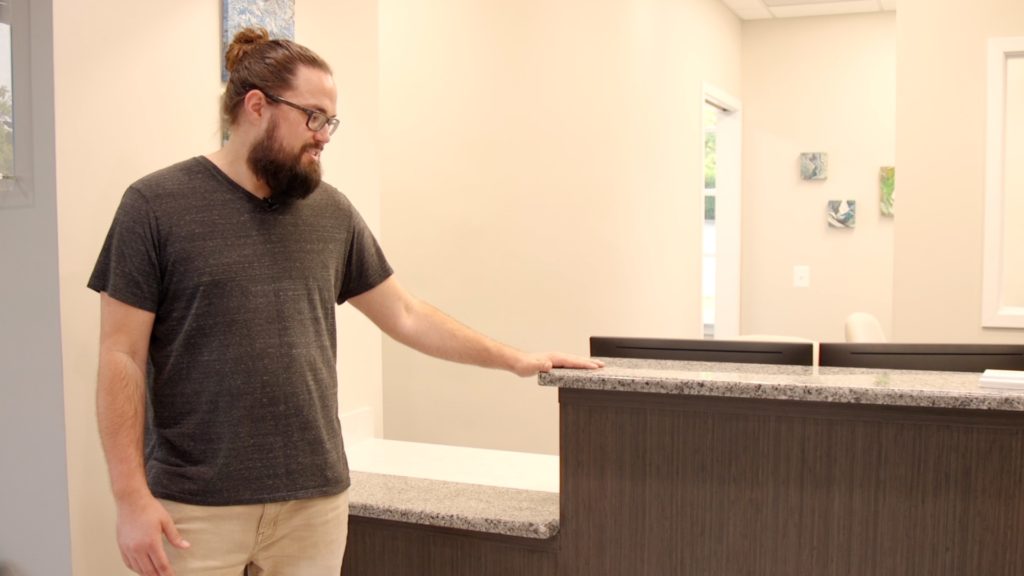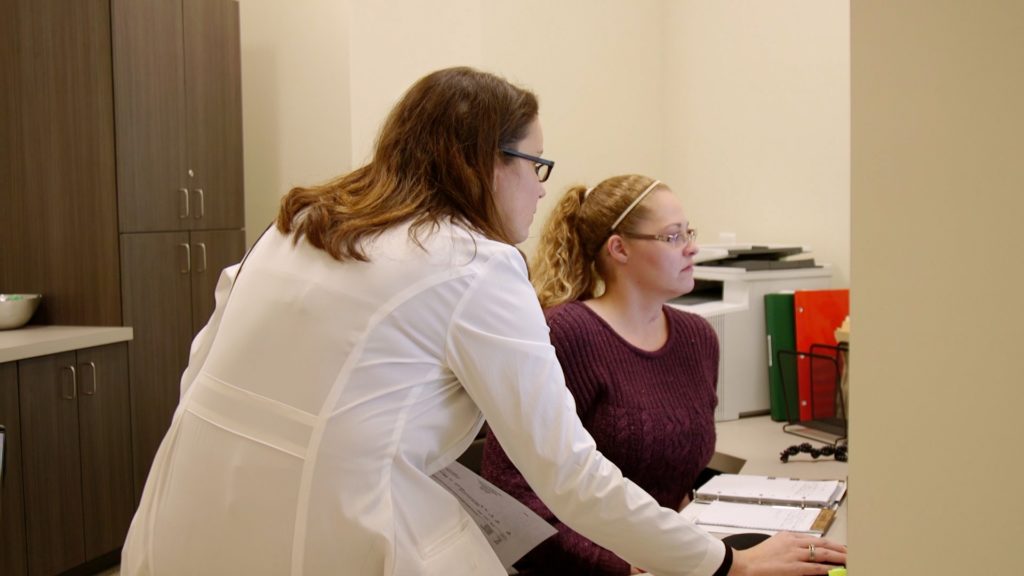


Partnerships in dentistry seem to offer lower risks. This is why so many doctors investigate partnership agreements for startups.
Before you decide to become dental partners with a colleague, consider these specific concerns that go beyond the typical “legal contract” advice.
If you still believe a partnership is right for you, make sure you understand the legal implications and take care of all the details—in writing, signed, and notarized—before you do anything else.
In this publication, you will read training based on the experience of guiding hundreds of startup practices and how partnership considerations affect the practice.
These are the top questions we will ask and answer below:
Have you ever heard of the Fortune 500?
This is an important concept for any dentist considering a partnership.
The Fortune 500 is the list of the top 500 public companies on the stock market. Those companies represent two-thirds of the United States’ gross domestic product.
Guess how many of those companies have 2 CEOs?
Four.
What does that tell you?
It means you have a 4 out of 500 chance that a business with 2 leaders is a good idea.
2 CEOs means you have 2 leaders.
Partnerships are a little like having 2 CEOs.
Can a dental practice succeed with two bosses? Sure. But do you want to begin your dental startup with a 4 in 500 chance of your plan being a good idea?
THE TRUTH about partnerships:
For a startup practice, partnerships carry risks that most dentists don’t realize early enough.
What will surprise you most is that the greatest risks extend beyond costs and legal concerns.
Many associate dentists pursue partnerships as an attempt to keep startup costs low. But too often, this results in expensive mistakes that cannot be undone.
In this article, I will show you how to avoid these outcomes.
My team and I work exclusively with startup practices. If you want a successful startup, I would like to show you what has worked for hundreds of startup dental offices across the country.
LEARN HOW THOUSANDS OF MY DOCTORS HAVE FOUND THE PERFECT LOCATION FOR THEIR PRACTICE.

The reality is, the vast majority of partnerships for dental startups fail. Most don’t even enjoy opening day because of the ensuing problems.
But could a partnership work for you?
Consider WHY before going into partnership.
The Example of Doctor A and Doctor B
Doctor A is a general dentist who loves crown & bridge procedures.
Doctor B is the potential partner who just finished her implant course and wants that skill to be her clinical focus.
Many dentists see these Complementary Skills.
And they think this is a great reason to become dental partners.
But complementary clinical skills are not complementary business skills.
Read that again.
This concept could protect you through the rest of your career.
Be careful – this is one of the worst situations for a startup practice partnership!
In any business, partnerships work best when there are 2 complementary business skills brought to the same table. (Notice, this is not the same as complementary clinical skills.)
Having complementary clinical skills would be like 2 CEOs being great at accounting. Maybe one excels in receivables, and the other knows all about paying bills—but neither is good at sales.
Both CEOs could count numbers all day.
But without sales, they have no numbers to count.
It’s like that with 2 dentists in a startup.
Adding more clinical skills does not make a startup succeed.
Additionally, adding more clinical skills will not lower your risk in a startup.
You must remember this if you are considering a partnership.
Instead, with a startup, your #1 goal must be to grow your patient base and your cash flow while delivering an excellent patient experience, not add another doctor because of a clinical skill.
Having 2 dentists in a startup does not accomplish this goal.
When DOES it Work to Have 2 Dental Partners?
Startup dental business partnerships CAN work—but only when it is blatantly and bluntly clear that while there are two owners, there is ONE leader.
Two shareholders—but ONE vision.
Two people who share in profit—but ONE decision-maker.
Two investors—but ONE boss.
2 ROLES FOR 2 PARTNERS
What can work well is when one partner is a dentist while the other has business skills that have been proven hundreds of times, in hundreds of practices.
In other words, you don’t need 2 dentists before you even have 2 patients.
For a dental startup, the key to partnership success is a separation of roles.
Role #1:
The most important role is held by one partner. This partner defines the vision.
Role #2:
Practice growth.
Notice, this has nothing to do with your legal agreement. This is a topic of having Complementary Skills that do not overlap.
In business, this would be like one CEO focusing on defining the vision and direction, while the other CEO spends “hands-on” time implementing the vision.
One creates the Vision, the other implements the Vision.
The Problem with Most Dental Business Partnerships is you end up with 2 people doing 1 person’s job.
Even worse—in most partnerships, no single person has ultimate authority.
Imagine how frustrated you would feel if your partner doesn’t create the same patient experience that you know is best for your practice.
You see the patient experience clearly in your mind…
But the partner doesn’t do it the right way.
And the team doesn’t do it the right way.
Which means your patients will get mixed messages.
Every time you’re away from the office, it runs like a different dental practice.
This happens. All. The. Time.
Don’t let it happen to you.
Your dental partner may try his best. But if one doctor doesn’t have the same passion and vision as you, the patients will notice. The team will notice. And often, partners in dental will spend years trying to create that patient experience, feeling like they’re swimming upstream as they struggle to implement their vision.
This problem consistently leads to the worst outcomes in partnerships.
The result is this…
Neither partner has the power.
Neither partner has the final say.
But both partners struggle for years, trying to reach their potential.
Why does this happen?
Because dentists believe the wrong information.
Business partnerships do not decrease your risk. Instead, partnerships increase the risk of losing your vision.
The best startups have one unified vision.
Then the team follows that one vision.
Not 2 visions. Not 2 leaders.
If you have a solid reason for two leaders in your dental office, by all means, look into it.
A partnership can work—with lots of work. And lots of signed and notarized legal documents.
But in typical business partnerships, group consensus is chased.
The downward spiral of compromising, just for the sake of a friendly “agreement,” starts to surpass “business health” if there is no clear consensus or chain of command.
Dental partners tell stories of constant “compromise,” resulting in a lack of real leadership. This causes the business to suffer.
To ensure partnership breeds a healthy dental practice, you must define one leader, one vision, one direction, and one goal. Two of any of those is hard on the patients, the team, the ownership, and the finances.
As you can see, partnership considerations go far beyond one partner placing implants and the other doing bread and butter dentistry.

Now, let’s look at some reasons a dental business partnership can be a fatal flaw. After all, you want what’s best for you, your family, your patients, and your community, right?
THE MYTH OF LOWER COSTS
Be careful with believing a partnership lowers costs.
Look at the entire financial picture for your startup. Consider your entire career—not just the startup loan.
Your dental startup is more than startup costs.
Your startup represents your future income and retirement savings plan.
Sure, with a business partner you are only on the hook for half the loan, but then you only get half the profits—for your ENTIRE career.
And when you sell your practice, you keep only half the gains. Simple math shows which is costlier.
“SAVE” TODAYS PARTNERSHIP COSTS:
Can you “save” half of your loan? Perhaps.
But remember the small impact this will have on your future finances!
For our clients, the entire dental startup loan payment is just a couple thousand dollars per month.
In other words, your total “cost-savings” may save you half of a loan payment.
A startup loan payment may sound like a large expense, but if you build your startup the right way, you will easily afford the monthly payments on the practice loan, even in the first month.
THE “WASTE” OF FUTURE PARTNERSHIP COSTS:
Most doctors don’t want to give away a couple of million dollars, right?
You will if you have a dental partner.
Worse, you will probably give up several million.
Do the math.
Let’s use conservative numbers and say your practice will have $200,000 of profit per year. Half of that is $100,000.
Your future dental practice will likely be worth well over a million dollars. You will give up 50 percent of that to a partner when you sell/retire.
TOTAL WASTE: $2,500,000
Mathematically, this waste is 10 TIMES MORE than the savings you might get from cutting your loan in half.
Think about it: a savings of $1,000 a month for the duration of your loan compared to $2.5 million.
Here’s the question you need to ask yourself:
If you could have a successful startup on your own, with a proven process…
Is your “partner” worth two and a half million dollars??

Many people believe a business partnership decreases risk.
But what if your potential partner has below average leadership abilities?
She could be an excellent dentist and person but have no real vision or clear goals. Maybe he is incapable of making practical decisions for long-term success, or she is either too nice or too mean to be an effective team leader.
What if the partner doesn’t take responsibility for simple tasks in the practice and everything falls on you? Everyone suffers when partnerships don’t run well.
Also, without clearly defined roles, important things could be missed if both bosses believe the other one took care of it.
Partnerships can have dramatic “soft-risks” that aren’t discovered until years into a frustrating and trapped relationship.
A business partnership is like a marriage.
Let’s face it—marriage is HARD.
The brutal truth is, more than 50 percent of marriages fail.
But business marriages are worse!
Like in a real marriage, you will deal with miscommunication, unintended hurt feelings, conflict, disagreements—the list goes on and on.
Disclaimer: I Iove my wife. She is my best friend and the most awesome person!
But while marriage can be rewarding, it takes a massive amount of work, from the first “I do” until actual “death do us part.” And it takes compromise. And forgiveness. It’s hard enough when you’re partnering with someone you would lay down your life for.
You “business marriage” can trap you legally, often in more expensive ways than your real marriage.
And you will see that person almost every day.
Are you sure you want to deal with the complexities of a business marriage when you could avoid it by being the only boss?
A business marriage should be looked at very, very carefully before tying the knot. It’s hard—and does not reduce risk.
IN FACT, business marriages INCREASE RISK, especially when there is a simple, proven way to own a successful startup without a partner.

What if there is an important decision and the two of you can’t agree?
Would the employees, patients, and sales reps know who to go to with their issues, problems, or questions? Will each decision require both of you to sign in agreement?
In a fast-paced environment, this can overcomplicate everything. It can also cause issues with productivity and seeing patients in a timely manner. In other words, it can affect patient care and finances. It can also cause conflicts in the office, especially if there are “favorites.”
I’m reminded of (many years ago!) when I was in driver’s ed class. The “student driver” car had two steering wheels and two brakes. The instructor could change my direction or slow me down at will. Would you, as a doctor, appreciate being controlled any less than a teenager does?
Imagine the trouble that could happen if both drivers (bosses) tried to turn in opposite directions at the same time with the same force? Or if one put the pedal to the metal while the other slammed on the brake? How would the car (employees) know what to do?
Visualize being in that same car with a power-hungry partner.
Someone who resents you because the patients like you better. Or is mad about a decision you made. Possibly overly emotional about issues at home?
One angry tug at the wheel at an unexpected moment could land you in a ditch or result in a head-on collision.
A car should have one driver.
A business should have one boss.
More than one will increase your risk.




We’ve already discussed how being dental partners is like a marriage. But let’s address this in more detail.
While 50 percent of marriages end in divorce, no one goes into a marriage expecting divorce. The vow is, “Till death do us part.”
So, why are there so many pre-nuptial agreements out there?
I don’t want to get into whether or not a marriage should have a prenuptial agreement. I believe marriage should last through all the vows—in sickness and in health, for richer or poorer, and yes—until death do you part.
Many think a prenuptial agreement shows a lack of commitment. Others see them as “smart.”
But when it comes to your business marriage???
You MUST go into it with your eyes wide open. With all the potential questions answered and agreed upon. Written. Signed. Notarized.
Maybe your partnership will be happy and last until “death do you part.” But then what? Who gets control of their half? Or what about sickness? Surely a spouse should remain committed, caring, and available if their partner is sick or terminally ill, but what if it’s your business partner? Do you have a plan if one of you can’t continue to work?
Maybe one partner is aggressive about wanting to build the practice bigger, but the other doesn’t want to participate in the work of doing that.
Even when dental partners start with the same business goals and ideas, people change. Life happens. Like two rowboats in the night, if you aren’t actively paddling in the same direction, drift occurs. You wake up miles apart.
What if you are a saver and want to invest more in your practice, but your partner has spent his profits and can’t afford it? Or you’re ready to cut back on hours, but your partner needs to make more and wants to increase them? What about when one is ready for retirement, but the other isn’t?
Do you see where I’m going?
Don’t ever go into a partnership without a solid pre-nuptial in place!
Now you know the true concerns about dental partnership agreements.
I’m sharing this with you because I’ve seen too many partnerships fail.
And what is the advantage anyway?
If your partnership…
…then ask yourself the question hundreds of startup doctors like you have asked:
How can I cut out the risk but still keep all the benefits?
Associate dentists – even without any business experience – have followed our proven startup model in areas all over the country and achieved tremendous success.
The best part about dental practice ownership (especially with startup practices), is that YOU CHOOSE your future.
When you do it right, you can REVERSE ENGINEER the whole process, so you get what you want—even before you begin. We’ve helped doctors do this all over the country and created some of the biggest successes in startup practice ownership.
All that to say…
Partnerships in dentistry are very, very tough to get right.
And once you tie the knot, it’s painful and difficult to undo.
Can you create the right partnership split agreement?
Maybe.
But even if you can, do you now see why the topic of partnership goes far beyond paperwork?
I suggest being hyper-clear about what you want to accomplish and be 100 percent sure you MUST have a partner on board to accomplish it.
Two dentists don’t decrease the risk. Legal paperwork won’t decrease your risk. A business marriage won’t make your practice easier. “Partners” who try to cut costs may find they actually decrease profit and give away millions of dollars…all while increasing complications and frustration.
However, if you’re an associate dentist, practice ownership can be the most rewarding part of your career when done right.
There are proven, fulfilling ways to open a successful dental startup WITHOUT partnership.
And interestingly, it’s not about the production or the money.
When done RIGHT, dentists in private practice say they enjoy the process. They love their patients and are proud of their impact on their community.
You can have the same success story. And all the while:
YOUR vision is pursued.
YOUR control is created.
YOUR future is designed
YOUR ideal patient is attracted.
Discover the 13 steps to opening your new practice and realize you can do this.
If you have a successful dental office and need help with growth, or if you are thinking about transition into retirement, Ideal Practices can help you do it right, the first time.
Instead of trying to find a partner for your practice, build your OWN practice. And do it the right way by partnering with a team that has proven success with over 100 startup dental practices.
To learn more:
Good luck to you on your journey into successful private practice ownership!
Privacy Policy: We hate SPAM and promise to keep your email address safe.
 Get a 1-on-1 Strategy Call
Get a 1-on-1 Strategy Call
 Speak with the #1 Startup Consultant in Dentistry
Speak with the #1 Startup Consultant in Dentistry
 Find Answers to Your Top Questions
Find Answers to Your Top Questions
 Avoid the Mistakes and Risks of Other Startups
Avoid the Mistakes and Risks of Other Startups
 Learn How Hundreds of Associates Used this Process
Learn How Hundreds of Associates Used this Process
 Get Customized Clarity for Your Startup Ideas
Get Customized Clarity for Your Startup Ideas
 Demographics, Real Estate and Marketing Topics
Demographics, Real Estate and Marketing Topics
 Discuss the Step-By-Step Startup Method
Discuss the Step-By-Step Startup Method
Ideal Practices is the leading consulting firm for startup dental practices. The consulting team guides dentists to open successful startups across the country. This website is a free resource founded by Ideal Practices.
As part of our passion for global entrepreneurialism, we fund 10 new startup businesses in 3rd world countries every time a client opens a new practice. By the year 2024 this effort will empower 4000 new entrepreneurs worldwide.
Get a 1-on-1 strategy call with the top Startup Strategy Advisor in dentistry.
Learn how startups work in dentistry.